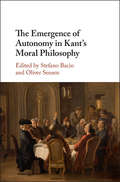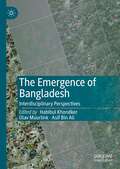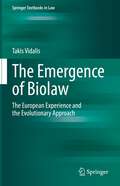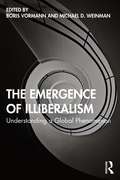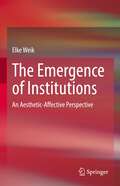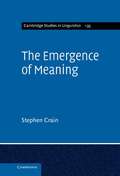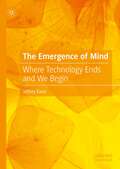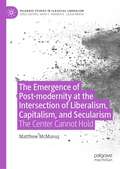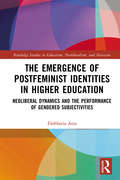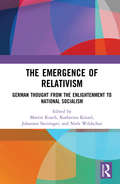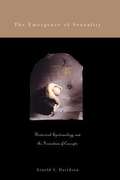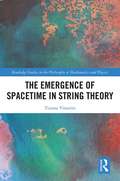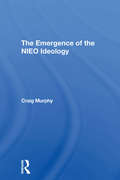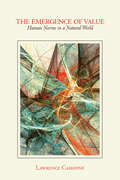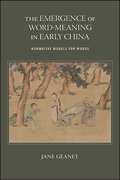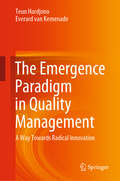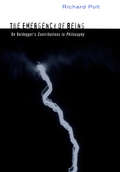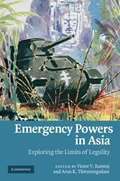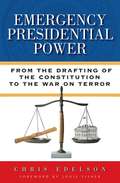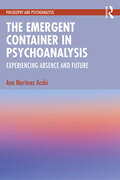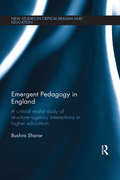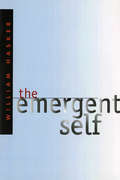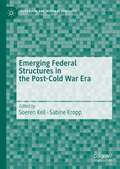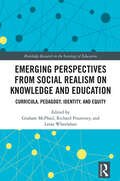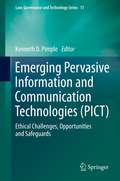- Table View
- List View
The Emergence of Autonomy in Kant's Moral Philosophy
by Stefano Bacin Oliver SensenAutonomy is one of the central concepts of contemporary moral thought, and Kant is often credited with being the inventor of individual moral autonomy. But how and why did Kant develop this notion? The Emergence of Autonomy in Kant's Moral Philosophy is the first essay collection exclusively devoted to this topic. It traces the emergence of autonomy from Kant's earliest writings to the changes that he made to the concept in his mature works. The essays offer a close historical and philosophical analysis of what prompted Kant to develop his conception of autonomy, charting the historical background which prompted his search, and thoroughly analysing different stages of his writings in order to see which element of autonomy was introduced at which point. The resulting volume will be of interest to both scholars and students of Kantian moral philosophy, as well as to anyone interested in the subject of autonomy.
The Emergence of Bangladesh: Interdisciplinary Perspectives
by Habibul Khondker Olav Muurlink Asif Bin AliThe Emergence of Bangladesh analyses and celebrates the first 50 years of Bangladesh as a nation, bringing insights from key scholars in Bangladeshi studies to an international audience, as well as ‘bringing home’ to a domestic audience the work of some of the nation’s greatest intellectual exports, the Bangladeshi scholars who have made a mark in their field of study in academia. The book offers unique coverage of the battlegrounds on which the founding of the new nation was fought, including language, power and religion, and provides unique insight into some of the hot spots that continue to shape the development of the nation: the issues of gender, culture, ethnicity, governance, the economy and the army. Those with an interest in understanding the past or present Bangladesh will find this a trove of frank and readable analysis.
The Emergence of Biolaw: The European Experience and the Evolutionary Approach (Springer Textbooks in Law)
by Takis VidalisThis book introduces “biolaw” as an integrated and distinct field in contemporary legal studies. Corresponding to the legal dimension of bioethics, the term “biolaw” is already in use in academic and research activities to denote legal issues emerging mostly from advanced technological applications. This book is a genuine attempt to rationalize the field of biolaw after almost four decades of continuous production of relevant legislation and judgments worldwide. This experience is a robust basis for defending a) a separate legal object, covering the total of legal norms that govern the management of life as a natural phenomenon in all its possible forms, and b) an “evolutionary” approach that opens the discussion on a future conciliation of legal regulation with the Theory of Evolution on the ground of biolaw.
The Emergence of Illiberalism: Understanding a Global Phenomenon
by Boris VormannAs illiberal and authoritarian trends are on the rise—both in fragile and seemingly robust democracies—there is growing concern about the longevity of liberalism and democracy. The purpose of this volume is to draw on the analytical resources of various disciplines and public policy approaches to reflect on the current standing of liberal democracy. Leading social scientists from different disciplinary backgrounds aim to examine the ideological and structural roots of the current crisis of liberal democracies, in the West and beyond, conceptually and empirically. The volume is divided into two main parts: Part I explores tensions between liberalism and democracy in a longer-term, historical perspective to explain immanent vulnerabilities of liberal democracy. Authors examine the conceptual foundations of Western liberal democracy that have shaped its standing in the contemporary world. What lies at the core of illiberal tendencies? Part II explores case studies from the North Atlantic, Eastern Europe, Turkey, India, Japan, and Brazil, raising questions whether democratic crises, manifested in the rise of populist movements in and beyond the Western context, differ in kind or only in degree. How can we explain the current popular appeal of authoritarian governments and illiberal ideas? The Emergence of Illiberalism will be of great interest to teachers and students of politics, sociology, political theory and comparative government.
The Emergence of Institutions: An Aesthetic-Affective Perspective
by Elke WeikThis book presents an experiential, aesthetic-affective approach to the study of institutions. Drawing on institutional sociology, hermeneutics, phenomenology and process philosophy, it conceptualises institutions as collective experiences with their own self-promoting and self-propelling powers. Instead of seeing institutional emergence, change and decline as the result of actors’ interests and manipulations, this book re-establishes the importance of factors beyond human design and intervention. Drawing on process theory, it shows how ideas, norms and values can form self-stabilising configurations that affect people without conscious realisation. It complements current thinking about institutions by showing how institutions constitute people long before people constitute them. With the help of authors as diverse as Antonio Damasio, A.N. Whitehead, J.W. von Goethe and Max Weber, Elke Weik crafts a perspective that allows us to understand institutions as aesthetic and affective powers in their own right. This book is for researchers interested in process theory, institutional and organisational studies, hermeneutics, and aesthetics.
The Emergence of Meaning
by Stephen CrainOver the past forty years, scientists have developed models of human reasoning based on the principle that human languages and classical logic involve fundamentally different concepts and different methods of interpretation. In The Emergence of Meaning Stephen Crain challenges this view, arguing that a common logical nativism underpins human language and logical reasoning. The approach which Crain takes is twofold. Firstly, he uncovers the underlying meanings of logical expressions and logical principles that appear in typologically different languages – English and Mandarin Chinese – and he demonstrates that these meanings and principles directly correspond to the expressions and structures of classical logic. Secondly he reports the findings of new experimental studies which investigate how children acquire the logical concepts of these languages. A step-by-step introduction to logic and a comprehensive review of the literature on child language acquisition make this work accessible to those unfamiliar with either field.
The Emergence of Mind: Where Technology Ends and We Begin
by Jeffrey KaneWhile it may appear that generative AI has mastered the mystery of the human mind and released its full power, The Emergence of Mind: Where Technology Ends and We Begin demonstrates the profound and fundamental limitations of the technology and its use as a model of human thinking. In response, the book offers an emergent model of the human mind rooted in our experiences as living, sentient, social and conscious beings. The text explores the nature of meaning in human cognition and the critical importance of the experience of ideas. In so doing, it offers insights into the cultivation of specific generative capacities of the human mind.
The Emergence of Post-modernity at the Intersection of Liberalism, Capitalism, and Secularism: The Center Cannot Hold (Palgrave Studies in Classical Liberalism)
by Matthew McManusThis book is a systematic and thorough analysis of what post-modernity is and how it emerged. It distinguishes between those who regard post-modernity as a theoretical approach and those who regard it as a culture, and argues that interpreting post-modernity as a culture is more fruitful. It discusses the three factors which led to its emergence, namely liberalism, capitalism, and secularism, highlighting their respective influence in generating the culture of post-modernity within neoliberal societies. The volume provides a lengthy analysis of neoliberal post-modernity in practice, arguing that post-modernism is the cultural condition of neoliberal societies in the late 20th and early 21st centuries. Until recently it seemed that neoliberal post-modernity was here to stay, framed by relationship to freedom and time which stressed individual agency but precluded the possibility of historical change at the political level. However, the Great Recession of 2008 opened new spaces for agitation and transformation which has resulted in the discordant politics of the last decade. This book will be of interest to scholars working in a number of fields, including economic policy, cultural analysis, political theory, and social critique.
The Emergence of Postfeminist Identities in Higher Education: Neoliberal Dynamics and the Performance of Gendered Subjectivities (Routledge Studies in Education, Neoliberalism, and Marxism)
by Eleftheria AttaBy drawing on qualitative research conducted in universities in Cyprus, this book presents an account of life in the academy from a feminist perspective. In doing so, the texts uncover new gendered identities emerging as a result of neoliberal and postfeminist discourses in Higher Education. Adopting a psychosocial lens, and drawing on theories of affect and performativity, this volume explains academics’ responses to growing levels of stress, anxiety, precarity and competition in their professional environment. Chapters offer rich observation of how academic staff and faculty negotiate aspects of femininity and masculinity within the academy, and so highlights the performance of ‘gendered academic subjectivities’ as a way in which academics deal with increasing pressures and anxiety. Ultimately proposing a typography of emergent, affective identities including industry academics, fossilised, family and wannabe academics, the volume yields important insights into the current workings of Higher Education and shows the personal and professional impacts of neoliberal dynamics. This volume will prove to be a useful resource for researchers and high-level scholars in the fields of education, sociology of education and gender studies. More generally, scholars and academics with an interest in the changing face of contemporary Higher Education will find this book informative.
The Emergence of Relativism: German Thought from the Enlightenment to National Socialism
by Martin Kusch Katherina Kinzel Johannes Steizinger Niels WildschutDebates over relativism are as old as philosophy itself. Since the late nineteenth century, relativism has also been a controversial topic in many of the social and cultural sciences. And yet, relativism has not been a central topic of research in the history of philosophy or the history of the social sciences. This collection seeks to remedy this situation by studying the emergence of modern forms of relativism as they unfolded in the German lands during the "long nineteenth century"—from the Enlightenment to National Socialism. It focuses on relativist and anti-relativist ideas and arguments in four contexts: history, science, epistemology, and politics. The Emergence of Relativism will be of interest to those studying nineteenth- and twentieth-century philosophy, German idealism, and history and philosophy of science, as well as those in related disciplines such as sociology and anthropology.
The Emergence Of Sexuality: Historical Epistemology And The Formation Of Concepts
by Arnold I. DavidsonThe essays that constitute this book were written, more or less independently of one another, over many years. All of them were first given as lectures, and are marked by the occasions of their presentation. I have not tried to erase their oral quality, nor have I excised a small number of repetitions that appear in related essays.
The Emergence of Spacetime in String Theory (Routledge Studies in the Philosophy of Mathematics and Physics)
by Tiziana VistariniThe nature of space and time is one of the most fascinating and fundamental philosophical issues which presently engages at the deepest level with physics. During the last thirty years this notion has been object of an intense critical review in the light of new scientific theories which try to combine the principles of both general relativity and quantum theory—called theories of quantum gravity. This book considers the way string theory shapes its own account of spacetime disappearance from the fundamental level.
The Emergence Of The Nieo Ideology
by Craig MurphyThis study traces the political history of the ideas underlying Third World calls for a New International Economic Order. Filling a significant gap in the literature, the book shows that NIEO ideology has a direct, unbroken line of development extending back to World War II, when a "new international economic order," the Bretton Woods system, was created. Dr. Murphy maintains that NIEO ideology is not rooted only in Third World acceptance of Prebisch's views on trade; rather, it evolved from Third World attempts to cope with problems and opportunities that emerged as the Bretton Woods system was created, operated, and began to break down. By the 1970s, the ideology had become a complex and coherent analysis of the economic position of Third World states, including a political analysis of how Third World views could be made dominant. Many of Dr. Murphy's conclusions challenge the conventional wisdom about the Third World position of the NIEO. In addition, his study offers insight into the relatively unexplored area of how changes in political and social consciousness affect international systems, and provides grounds on which officials from both the South and the North can see the others' views as less alien.
The Emergence of Value: Human Norms in a Natural World (SUNY series in American Philosophy and Cultural Thought)
by Lawrence CahoonePhilosophers, social scientists, and natural scientists argue over whether a natural scientific account of human being is compatible with uniquely human norms like ethics, justice, art, and the concern for truth. Many attempts at such an account have been tried and failed; others, like evolutionary psychology, have tried but stumbled. The Emergence of Value argues that a broad enough understanding of nature and human nature can incorporate human values and norms, without reducing them to inhuman processes. Lawrence Cahoone advances the position that nature includes values as well as facts, and human uniqueness is therefore compatible with nature, as it must be. To demonstrate this, we must consider multiple sciences and recent philosophical traditions and their impact on our notions of truth, morality, justice, and beauty.
The Emergence of Word-Meaning in Early China: Normative Models for Words (SUNY series in Chinese Philosophy and Culture)
by Jane GeaneyThe Emergence of Word-Meaning in Early China makes an innovative contribution to studies of language by historicizing the Chinese notion that words have "meaning" (content independent of instances of use). Rather than presuming that the concept of word-meaning had always existed, Jane Geaney explains how and why it arose in China. To account for why a normative term (yi, "duty, morality, appropriateness") came to be used for "meanings" found in dictionaries, Geaney examines interrelated patterns of word usage threading through and across a wide range of genres. These patterns show that by the first millennium, as textual production exploded—and as radically different writing forms (in Buddhist sutras) were encountered—yi already functioned as an externally accessible "model" for semantic interpretation of texts and sayings.The book has far-reaching implications. Because the idea of word-meaning is fundamental to theorizing, the book illuminates not only semantic ideas and the normativity of language in Early China, but also aspects of early Chinese philosophy and intellectual history. As the internet supplants one form of media (print), thereby reducing knowledge to vast digital databases, so too, this book explains, two thousand years ago a culture that prized oral and visual balance became an "empire of the text."
The Emergence Paradigm in Quality Management: A Way Towards Radical Innovation
by Teun Hardjono Everard van KemenadeThis book is focused on quality management, and four different lenses which can be used to explore the phenomenon. It introduces emergence as a paradigm in thinking about quality, and explores conditions which are beneficial to radical innovation. The Emergence Paradigm in Quality Management provides an overview of the existing movements in thinking about quality, and discusses why these movements in fact represent paradigms. Three paradigms, the Empirical Paradigm, the Reference Paradigm and the Reflective Paradigm, are explained followed by a search for the Fourth Paradigm, the so-called Emergence Paradigm, which presents a route to radical innovation in organizations when plans, strategies and models fail. It presents the debates around the paradigms, and explores which is the best approach. This professional text will be ideal for strategy and policy makers wanting to establish a link between their conceived plans and the attention for quality, while finding ways to facilitate innovation. Professionals in a range of for-profit and non-profit organizations, including healthcare, will be able to expand their knowledge on quality management, operations management, and organizational studies.
The Emergency of Being
by Richard Polt"The heart of history, for Heidegger, is not a sequence of occurrences but the eruption of significance at critical junctures that bring us into our own by making all being, including our being, into an urgent issue. In emergency, being emerges. "-from The Emergency of Being The esoteric Contributions to Philosophy, often considered Martin Heidegger's second main work after Being and Time, is crucial to any interpretation of his thought. Here Heidegger proposes that being takes place as "appropriation. " Richard Polt's independent-minded account of the Contributions interprets appropriation as an event of emergency that demands to be thought in a "future-subjunctive" mode. Polt explores the roots of appropriation in Heidegger's earlier philosophy; Heidegger's search for a way of thinking suited to appropriation; and the implications of appropriation for time, space, human existence, and beings as a whole. In his concluding chapter, Polt reflects critically on the difficulties of the radically antirationalist and antimodern thought of the Contributions. Polt's original reading neither reduces this challenging text to familiar concepts nor refutes it, but engages it in a confrontation-an encounter that respects a way of thinking by struggling with it. He describes this most private work of Heidegger's philosophy as "a dissonant symphony that imperfectly weaves together its moments into a vast fugue, under the leitmotif of appropriation. This fugue is seeded with possibilities that are waiting for us, its listeners, to develop them. Some are dead ends-viruses that can lead only to a monolithic, monotonous misunderstanding of history. Others are embryonic insights that promise to deepen our thought, and perhaps our lives, if we find the right way to make them our own. "
Emergency Powers in Asia: Exploring the Limits of Legality
by Victor V. Ramraj Arun K. ThiruvengadamWhat is the relevance of contemporary debates over emergency powers for countries situated in Asia? What role does, and should, the constitution play in constraining these powers? The essays in this collection address these issues, drawing on emergency situations in over 20 countries in Asia as a ready-made laboratory for exploring the relationship between emergency powers and constitutionalism. This volume therefore rests squarely at the intersection of two debates - a debate over the ability of law to constrain the invocation and use of emergency powers by the executive in times of crisis, and a debate over the nature and viability of constitutionalism in Asia. At this intersection are fundamental questions about constitutionalism and the nature of the modern state, questions that invite legal, political, sociological and historical analysis.
Emergency Presidential Power
by Chris EdelsonCan a U. S. president decide to hold suspected terrorists indefinitely without charges or secretly monitor telephone conversations and e-mails without a warrant in the interest of national security? Was the George W. Bush administration justified in authorizing waterboarding? Was President Obama justified in ordering the killing, without trial or hearing, of a U. S. citizen suspected of terrorist activity? Defining the scope and limits of emergency presidential power might seem easy-just turn to Article II of the Constitution. But as Chris Edelson shows, the reality is complicated. In times of crisis, presidents have frequently staked out claims to broad national security power. Ultimately it is up to the Congress, the courts, and the people to decide whether presidents are acting appropriately or have gone too far. Drawing on excerpts from the U. S. Constitution, Supreme Court opinions, Department of Justice memos, and other primary documents, Edelson weighs the various arguments that presidents have used to justify the expansive use of executive power in times of crisis. Emergency Presidential Power uses the historical record to evaluate and analyze presidential actions before and after the terrorist attacks of September 11, 2001. The choices of the twenty-first century, Edelson concludes, have pushed the boundaries of emergency presidential power in ways that may provide dangerous precedents for current and future commanders-in-chief.
The Emergent Container in Psychoanalysis: Experiencing Absence and Future (Philosophy and Psychoanalysis)
by Ana Martinez AcobiDrawing largely from the psychoanalytic ground of Jung, Bion and Winnicott, from Plato and Whitehead and from numerous clinical studies, this book explores ‘Absence’ and ‘Future’ in the context of their many emotional and conceptual meanings. Bringing together absence and future with Plato’s concept of the ‘receptacle’ as described in the Timaeus and with Whitehead’s handling of it, the author examines containment in psychoanalytic process. Here Jung’s concept of ‘container’ (Tavistock Lectures, 1935) is in an ancient and continuing tradition of process thinking. The term ‘emergent container’ has been coined as the metaphorical and metaphysical space where the interplay between potentiality and actuality meet in the process of emergent reality. As absence emerges, experience consciousness develops, as well as the potential for symbolic thinking. In this sense, the experience of absence is considered as a potential container for and of creativity. If absence does not emerge as experience, there often follows the compulsion to fill emptiness with hallucination. Absence as it plays into the experience of containment is a key factor in the developmental and psychoanalytic process. The Emergent Container in Psychoanalysis offers an exciting prospect for further research by psychotherapists and philosophers interested in the field of contemporary psychoanalytic thinking within and beyond their discipline. The book is also of great value to the inquisitive reader open to an exploration of human nature not confined to a single body of knowledge.
Emergent Pedagogy in England: A Critical Realist Study of Structure-Agency Interactions in Higher Education (New Studies in Critical Realism and Education (Routledge Critical Realism))
by Bushra ShararThis book aims to show how a meta-theory of critical realism can be applied to research about pedagogy in the changing landscape of higher education in England. It introduces some of the key ideas of critical realism, and its potential to clarify complex issues that arise in research. This book draws on a critical realist study of structure/agency interactions in three contrasting higher education institutions. Seven case studies of lecturers, over the three universities, are considered to explore the interplay of global, national and institutional structures and processes in their everyday working lives and the extent of their agency in these settings. Conceptual approaches to pedagogy are developed through an application of critical realism to the nature of knowledge, human agency and structure-agency interactions against the changing landscape in higher education at global, national and institutional levels. The book offers a way out of the current malaise in educational research which appears to be stuck between empiricist reductionism and hermeneutic interpretive positions. Highlighting the importance of ontological analyses, this book explores a realist approach to learning, pedagogy and knowledge in English higher education and will be of interest to students, scholars and practitioners working in education, critical realism and philosophy more generally.
The Emergent Self
by William HaskerIn The Emergent Self, William Hasker joins one of the most heated debates in analytic philosophy, that over the nature of mind. His provocative and clearly written book challenges physicalist views of human mental functioning and advances the concept of mind as an emergent individual. Hasker begins by mounting a compelling critique of the dominant paradigm in philosophy of mind, showing that contemporary forms of materialism are seriously deficient in confronting crucial aspects of experience. He further holds that popular attempts to explain the workings of mind in terms of mechanistic physics cannot succeed. He then criticizes the two versions of substance dualism most widely accepted today--Cartesian and Thomistic--and presents his own theory of emergent dualism. Unlike traditional substance dualisms, Hasker's theory recognizes the critical role of the brain and nervous system for mental processes. It also avoids the mechanistic reductionism characteristic of recent materialism. Hasker concludes by addressing the topic of survival following bodily death. After demonstrating the failure of materialist views to offer a plausible and coherent account of that possibility, he considers the implications of emergentism for notions of resurrection and the afterlife.
Emerging Federal Structures in the Post-Cold War Era (Federalism and Internal Conflicts)
by Soeren Keil Sabine KroppThis book conceives federalism not as a static institutional architecture, but as a dynamic formation always in flux. This may entail processes of federalization, but in some cases also lead to de-federalization. It looks at emerging federal structures worldwide and analyses federal structures: their emergence, operation and categorization. The contributors highlight that the “emergence” of these federal structures has multiple facets, from the recognition of ethnic diversity to the use of federalism as a tool of conflict resolution. Identifying and categorizing processes of federalization and defederalization in a variety of cases, the book provides much needed empirical and theoretical discussion on emerging federal structures and the changing nature of federalism in the post-Cold War era.
Emerging Perspectives from Social Realism on Knowledge and Education: Curricula, Pedagogy, Identity, and Equity (Routledge Research in the Sociology of Education)
by Graham McPhail Richard Pountney Leesa WheelahanThis book brings the key ideas and concepts of social realism to bear on current debates in the fields of knowledge and curriculum.The key concern of this collection is to highlight matters related to knowledge and the influence these dimensions have on the formation of curricula, pedagogy, identity, and equity in educational contexts. Presenting new perspectives on the place of various types and forms of knowledge in contemporary education, this book explores two central questions, ‘what type of knowledge is most important to include in a curriculum?’ and ‘what is meant by disciplinary knowledge?’ The chapters use empirical examples to illustrate how the issues play out on a global stage, interweaving the social justice concern of equitable access to disciplinary knowledge throughout. In particular, the authors address the emerging theorisation of issues related to the decolonisation of curricula, the recontextualisation of ‘non-traditional’ knowledge into the curriculum, and teacher education.Offering new philosophical and theoretical perspectives, this book will be of interest to researchers, scholars, and students examining the fields of knowledge and curriculum, and the sociology of education more broadly.
Emerging Pervasive Information and Communication Technologies (PICT): Ethical Challenges, Opportunities and Safeguards
by Kenneth D. PimpleThis book provides a wide and deep perspective on the ethical issues raised by pervasive information and communication technology (PICT) - small, powerful, and often inexpensive Internet-connected computing devices and systems. It describes complex and unfamiliar technologies and their implications, including the transformative potential of augmented reality, the power of location-linked information, and the uses of "big data," and explains potential threats, including privacy invaded, security violated, and independence compromised, often through widespread and lucrative manipulation. PICT is changing how we live, providing entertainment, useful tools, and life-saving systems. But the very smartphones that connect us to each other and to unlimited knowledge also provide a stream of data to systems that can be used for targeted advertising or police surveillance. Paradoxically, PICT expands our personal horizons while weaving a web that may ensnare whole communities. Chapters describe particular cases of PICT gone wrong, but also highlight its general utility. Every chapter includes ethical analysis and guidance, both specific and general. Topics are as focused as the Stuxnet worm and as broad as the innumerable ways new technologies are transforming medical care. Written for a broad audience and suitable for classes in emerging technologies, the book is an example of anticipatory ethics - "ethical analysis aimed at influencing the development of new technologies" (Deborah Johnson 2010). The growth of PICT is outpacing the development of regulations and laws to protect individuals, organizations, and nations from unintended harm and malicious havoc. This book alerts users to some of the hazards of PICT; encourages designers, developers, and merchants of PICT to take seriously their ethical responsibilities - if only to "do no harm" - before their products go public; and introduces citizens and policy makers to challenges and opportunities that must not be ignored.
